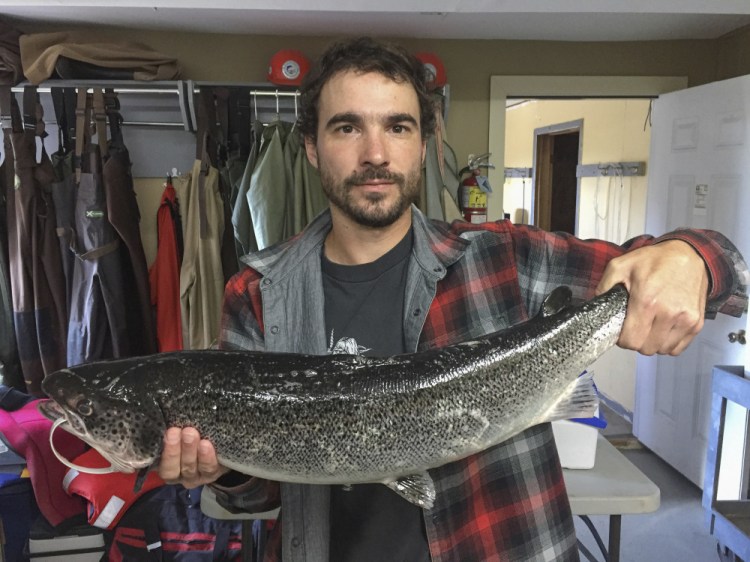A conservation group’s discovery that no wild Atlantic salmon have returned to a key river in New Brunswick is prompting concern for the fish’s population health in the U.S. and eastern Canada.
The New Brunswick-based Atlantic Salmon Federation has monitored the Magaguadavic River for the Canadian government since 1992. The group says this year is the first time since then that no wild salmon have returned to the river to spawn.
Atlantic salmon were once abundant in the rivers of New England and eastern Canada, but they’re now endangered or have disappeared in parts of both. The U.S.’s National Marine Fisheries Service is in the midst of reviewing the Gulf of Maine’s population, which is listed as endangered under the Endangered Species Act.
About 900 wild salmon entered the river to spawn in 1983, and the fact that none returned this year is bad news for the fish in Maine and Canada, said Neville Crabbe, spokesman for the Atlantic Salmon Federation.
“It means for the Magaguadavic River, whatever wild salmon that existed there are now extinct,” Crabbe said.
Atlantic salmon populations have suffered because of dams, loss of habitat, pollution, climate change and overfishing. They cannot be legally fished commercially in the U.S., but continue to face fishing pressure from Greenland. The only native populations of Atlantic salmon left in the U.S. are in Maine, though restoration efforts are afoot elsewhere in New England.
Maine’s most active salmon river is the Penobscot River, and returns there have ebbed and flowed over the years, said Dan Kircheis, a fisheries biologist with the National Marine Fisheries Service. Nearly 850 have returned this year, which is an improvement from 261 in 2014, but far fewer than more than 1,950 that returned in 2009, according to fisheries service statistics.
The Magaguadavic River is located about 45 minutes from the Maine border.
The Atlantic Salmon Federation places some of the blame for wild salmon’s struggles off of New Brunswick on salmon farming in the area.
Cooke Aquaculture, the biggest player in salmon farming in New Brunswick and Maine, is required to report escapes, and there have been very few in recent years, said Nell Halse, a Cooke spokeswoman.
Send questions/comments to the editors.



Success. Please wait for the page to reload. If the page does not reload within 5 seconds, please refresh the page.
Enter your email and password to access comments.
Hi, to comment on stories you must . This profile is in addition to your subscription and website login.
Already have a commenting profile? .
Invalid username/password.
Please check your email to confirm and complete your registration.
Only subscribers are eligible to post comments. Please subscribe or login first for digital access. Here’s why.
Use the form below to reset your password. When you've submitted your account email, we will send an email with a reset code.